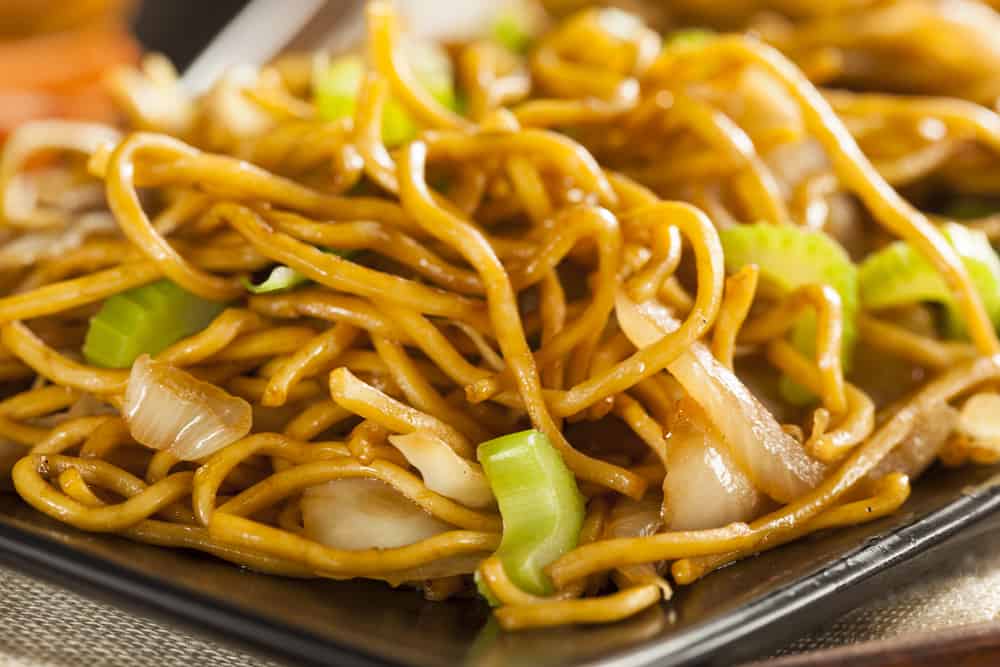While you’re probably one of many people who enjoy the Panda Express chow mein as a meatless dish, you may be surprised to learn that it’s not considered vegan, or vegetarian, for that matter. Read more to learn a little about the cooking process and the ingredients used to make most Chinese American takeout.
Related: Vegan Options at Panda Express
What is in Panda Express Chow Mein?
On the official Panda Express Chinese Kitchen website is a PDF document called an Ingredient State that lists the ingredients used in all of their dishes. You’ll find it near the footer of the Nutrition Information page. It lists the chow mein ingredients as follows: cabbage, enriched wheat flour, water, onion, soybean oil, celery, contains less than 2% of rice, wheat, caramel color, sesame oil, wheat gluten, canola oil, cottonseed oil, dextrose, sugar, malted barley flour, monoglycerides, DATEM, l-cysteine hydrochloride, ascorbic acid, enzyme, modified cornstarch, xanthan gum, potassium carbonate, salt, sodium carbonate, yellow 5, yellow 6, potassium bicarbonate. Panda Express also uses a proprietary sauce that contains soy.
How is it Made?
The chow mein is made using the same equipment and cooking space as all other dishes. In order to be considered vegan, meatless dishes require cooking in a designated area where these wouldn’t come in contact with animal or dairy products.
The chow mein, like its other entrees and sides, is made fresh daily using a wok before being placed in a cafeteria-style food warmer. Since extremely high heat is used in the cooking process, this allows your food to be ready in a short amount of time.
Does it Have Meat?
Panda Express chow mein doesn’t contain meat or meat by-products. However, ingredients like soy, the main ingredient found in soy sauce sometimes undergo a fermenting process that includes fish, such as dried anchovies. While many of the major condiment brands have stopped using animal products, a few still list fish as one of the ingredients
Does it Have Eggs?
The Panda express chow mein doesn’t use eggs or egg products, according to the company’s Ingredient State.
Does it Have Dairy?
I found no dairy products listed on the website for the Panda Express chow mein.
Vegan Substitutes for Soy Sauce
Currently, there are no nationwide chain restaurants offering Chinese American vegan options. One popular soy sauce alternative, liquid amino acids, has a wealth of nutritional benefits missing from a lot of vegan diets. It’s made with organic soybeans that undergo a process using an acid solution that breaks these into amino acids. Liquid amino acids don’t contain fish, wheat, or gluten found in most soy sauce brands and its sodium content is nearly half that of the average soy sauce brand sold in the United States.
If you’re looking to avoid soy altogether, coconut aminos sauce is also a good choice. Made from coconut palm blossoms, the process includes fermenting or using an acid wash similar to liquid amino acids. The final result is a slightly sweeter taste than regular umami soy sauce. Another benefit is the sodium content, which is less than a third of regular soy sauce.
Final Word
While Panda Express is known for offering a few meatless dishes, there’s one reason why the chow mein cannot be considered part of a vegan diet. Look at the Nutrition Information page on the website and you’ll see that it states all foods prepared in its restaurants share the same equipment and cooking space. In order to be considered vegan, meatless dishes require cooking in a designated area where these wouldn’t come in contact with animal or dairy products. This is why none of their foods fall into the vegetarian or vegan diet categories, according to the website.



